02 May 2023
How to Cite a Poem in APA, MLA, and Chicago Citation Styles
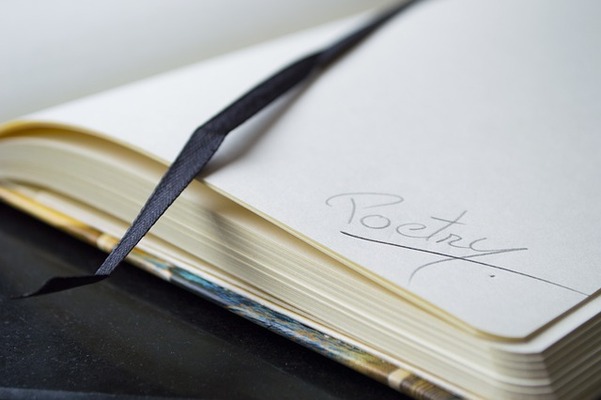
If you're like me, a good quote on writing from your choice writer at the end of a bad day can brighten your mood. I enjoy learning from these experiences, writing their words on sticky notes and putting them all around my writing space. The greats who came before us can teach us so much about the craft of poetry writing. We're lucky to live in a free information age that means many of us can benefit from writers currently creating works and filling our bookshelves with their collections.
I may not get banished from work because I wrote an inspirational line to cheer me up on my desk, but you could. Students must learn how to cite a poem to avoid plagiarizing poets and ensuring they get high grades.
Learn a few tips on how to cite a poem in this perfectly crafted guide.
Citing a Poem in APA
Learning to cite a poem that has a proper works cited entry in APA style is an important skill. The basic guidelines appear similar to those used for other papers. However, a poem has a unique design that requires specialized citation. You must carefully discern how to begin referencing the poem. Note these items as you cite your poem. Some may be irrelevant to your specific assignment.
- Title of poem
- Publication year
- Publisher name
- Page numbers
- Book title

How Do You Cite a Poem from a Book in APA?
For this section, we'll use the APA 6th and 7th editions. APA guidelines state that a writer should create a reference based on where they found the poem, that is, its publisher (e.g., book, web page).
A writer must provide the author's last name, the publication year, and stanza in the in-text citation (e.g., Neruda, 1914, stanza 2).
How Do I Cite in APA Format?
APA guidelines dictate that you must use the author-date method for in-text citation. This means that a poet's last name and year published for your source must appear in the text, like, for instance, (Frost, 1968).
A complete reference for each source should appear in your "Works Cited" page(s) at the end of the paper.
Citing a Poem from a Book
If you take your poem citation from a book, you must use the following format.
Poet's Last Name, First Name. "Title of the Poem." Title of the Book: Subtitle (if any), edited by Editor's First Name Last Name, Edition (if provided and is not the first), Publisher's Name (frequently shortened), Year of Publication, pp. xx-xx.
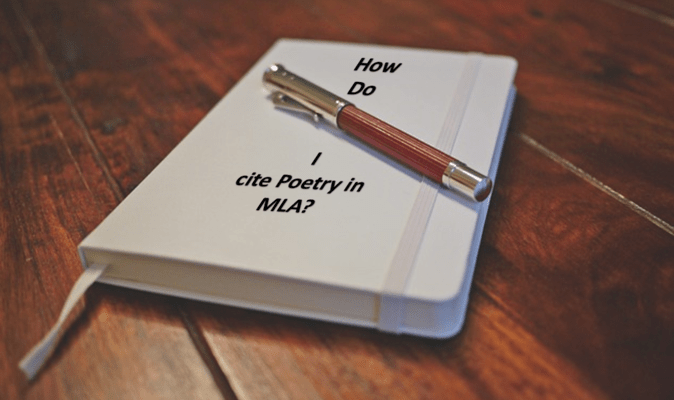
MLA In-text Citations for Poems
The main rules for citing a poem line are similar to those for quoting other sources. You must place the quoted text within quotation marks and cite the author's surname as well as the year published in brackets.
If provided, include the page number for your quoted passage.
Your Works Cited entry should begin with the poet's name with the title of the poem following in quotation marks. You should then include details about your source, where the poem was published.
The most commonly followed citation format is Modern Language Association (MLA) style.
How do You Cite a Stanza in a Poem?
In brief verse quotations, you must quote all or part of a line of verse and put it in quotation marks within the text.
Quoting Up to Three Lines of Poetry
You could also utilize two or three lines in a similar way. Using a slash with a space on each side to separate the lines (/).
A writer should also use two slashes to show a stanza break in a quote.

Should You Italicize Poem Titles?
Poem titles and those for short stories should go in quotation marks. You should italicize the title of a short story or poem collection. For instance, we'd cite Andre Dubus' "The Intruder," a short story appearing in his collection "Dancing After Hours" as, Dancing After Hours.
How to Quote Poetry in MLA Style
Let's briefly review the rules for quoting poetry using the MLA citation guidelines. If you are quoting two or three lines of poetry, you can show where the line breaks are by adding a slash between the lines as in the following example.
The poem opens with an allusion to Chaucer: "April is the cruellest month, breeding / Lilacs out of the dead land” (1-2).
So this tells us that the line ends with "breeding" and then we add the slash (surrounded by spaces) to indicate that there's a break there. If there's a stanza break (if you're jumping from one stanza to the next), you can add an extra slash to show that that's happening.
Use a slash to separate lines in a poetry quotation while making sure to mention the artist’s last name either in parentheses after quote or in your text. Show your reader the quote’s location, line numbers and all, or page number if the poem spans multiple pages. If you must quote poetry, make sure that you properly format the quotation –both in your works cited page in the in-text citation-to direct your audience to the correct source entry in the final reference list.
Whether you are citing two or three lines, remember to use the same capitalization, styling, and punctuation as in the original document.
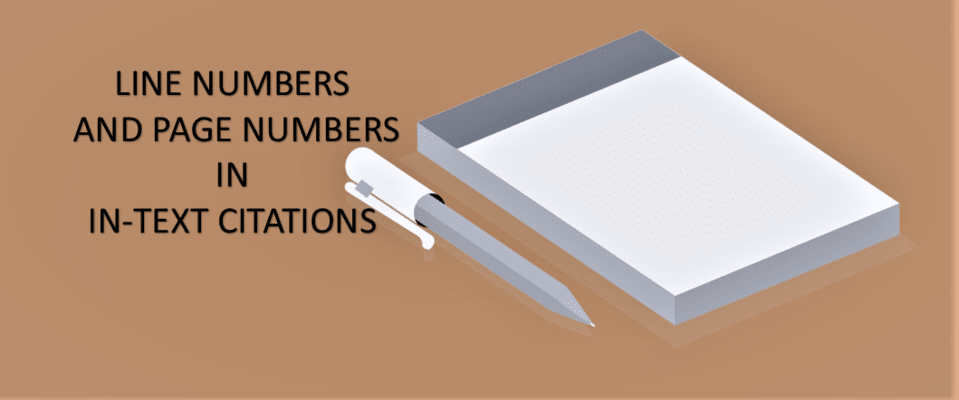
Line Numbers and Page Numbers in In-text Citations
Do remember that if you are skipping words to jump from one place to the next, you have to add ellipses. We add the line numbers to our citation to make sure it meets the MLA style.
If you're going back and forth between , let's say, pages and line numbers in your essay, then you may indicate that your in text citation refers to lines. You could put the word ""lines or line" in front of the numbers. The latter applies if your citation is one long quotation derived from one line. This is something you should watch out for. Many students lose marks because of a simple mistake using this citation format.
But if you are constantly quoting from the same source and it's clear that these are line numbers, then you can simply omit the word "line(s)."
Quoting Up to Three Lines of Poetry
If you're quoting more than three lines of poetry, then you should use a block quote. A block quote in poetry is very similar to a regular block quote.
Remember to use an introductory sentence that ends with a colon before starting your quotation on a new line that’s indented half an inch from the left margin and has no quotation marks.
Citing four lines or more, that is, using block quotes means including every line break present in the quotation and maintaining the formatting as similar to the original as possible. For instance, include any unusual spaces if they are present in your block quote.
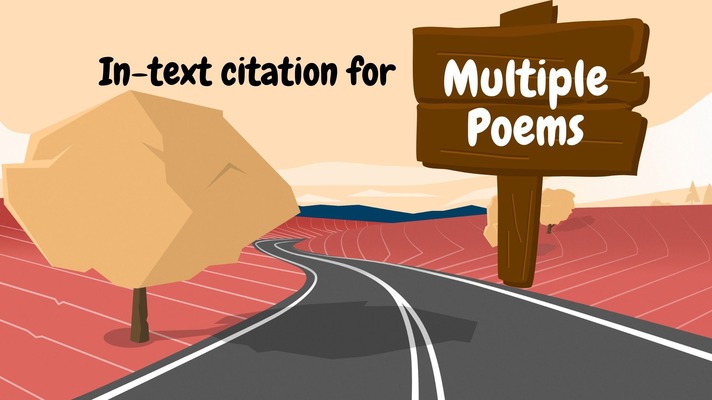
In-text Citation for More than One Poem
When you cite more than one poem from the same author, make sure you mention the poem’s title.
You will often name the title and poet in your main text when you introduce a quote. Contrary to this, when an ambiguity exists about the poem you are referring to, introduce the author name and/or title using a parenthetical citation. This appears after your quote.
MLA Works Cited Entry for a Poem
You must remember that every in-text citation must have a bibliography entry. It is a good practice to create a cited list of your references as you input the in-text citation. This leaves less room for error if you forget about a citation and fail to note it as you go through your work, leaving it out of your works cited page.
Let's look at the MLA format to use for a works cited entry according to the MLA handbook.
Author of Poem's Last Name, First Name. "Title of Poem." Title of Book: Subtitle if Any, edited by Editor's First Name Last Name, Edition if given and is not first, Publisher Name often shortened, Year of Publication, pp. Page Numbers of the Poem.
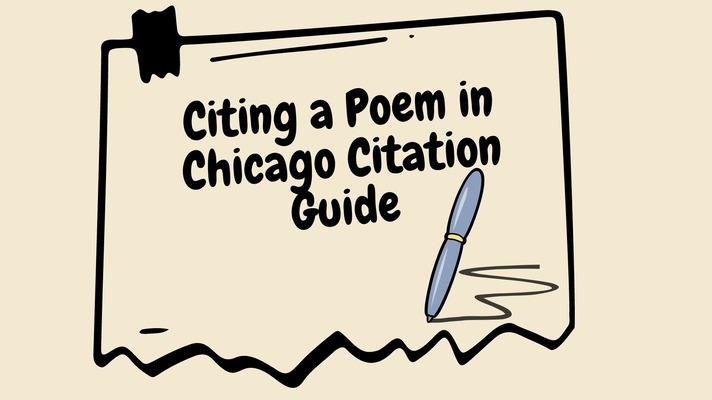
Jonathan Meyer/pexels
Citing a Poem in Chicago Citation Guide
We'll use the 17th edition to help you learn about citing a poem using the Chicago Style Guide. Check out the framework for the footnote and bibliography entries respectively.
- Footnote
- Bibliography entry
Let's use The Road Not Taken, a poem by Robert Frost that has a famous line involving "yellow wood" to demonstrate these entries.
- Footnote
1. Author's First Name Last Name, "Title of Poem," in Title of Book: Subtitle if Any, Edition if given and is not first edition, ed. Editor's First Name Last Name (Place of publication: Publisher, Year), Page Number.
Robert Frost, "The Road Not Taken," in The Road Not Taken and Other Poems, Anniversary edition. (Penguin books: Penguin classics, 2015), 1.
- Bibliography Entry
Author's Last Name, First Name. "Title of Poem." In Title of Book: Subtitle if Any. Edition if given and is not first edition, edited by Editor's First Name Last Name, Page Range of Chapter or Part. Place of publication: Publisher, Year.
Frost, Robert. "The Road Not Taken." In The Road Not Taken and Other Poems. Anniversary edition, 1-3. Penguin books: Penguin classics, 2015.
You must cite page numbers in each footnote. Add the page range for the chapter used in your bibliography entry.
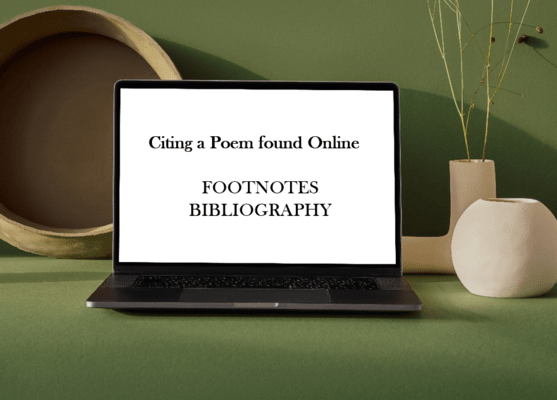
Karina Zhukovskaya/pexels
Citing a Poem Found Online in Chicago Style Guide
We'll follow the same framework and Robert Frost's poem to show you how to cite a poem you found online.
- Footnote
- Bibliography
1. Footnote
Author's First Name Last Name, "Title of Poem," Title of Website, Name of Owner or Sponsor of the Website [if different from Title of Website], Date of copyright or modification or access, URL.
Robert Frost, “The Road Not Taken,” Poetry Foundation, accessed March 30, 2023, https://www.poetryfoundation.org/poems/44272/the-road-not-taken.
2. Bibliography
Author's Last Name, First Name. "Title of Poem." Title of Website. Name of Owner or Sponsor of the Website [if different from Title of Website]. Date of copyright or modification or access. URL.
Frost, Robert. “The Road Not Taken.” Poetry Foundation. Accessed March 30, 2023. https://www.poetryfoundation.org/poems/44272/the-road-not-taken.

Luana Freitas/pexels
Poetry Foundation
The Poetry Foundation is a birth child of American literary society. It seeks to boost lyricism and poetry across the country. You could find a poem online from this source that meets your taste. Whether your favorite poet focuses on long poems with four or more lines in each stanza, they'll definitely have some sweet poems that may pique your interest.
The Foundation was created from Poetry magazine that runs to date. It saw a major boost in 2003 when philanthropist Ruth Lilly gifted them with a $200 million cheque!
Remember that a citation format will change with time as experts make adjustments. Note the citation style and edition in your assignment before you start writing your paper. Keeping yourself updated on the novel citation edition, whether in the MLA format or another, could make all the difference when a poem appears as your assignment.
Here's a parting shot to help you on your journey to learn how to cite a poem.
“Poetry is the spontaneous overflow of powerful feelings: it takes its origin from emotion recollected in tranquility.”